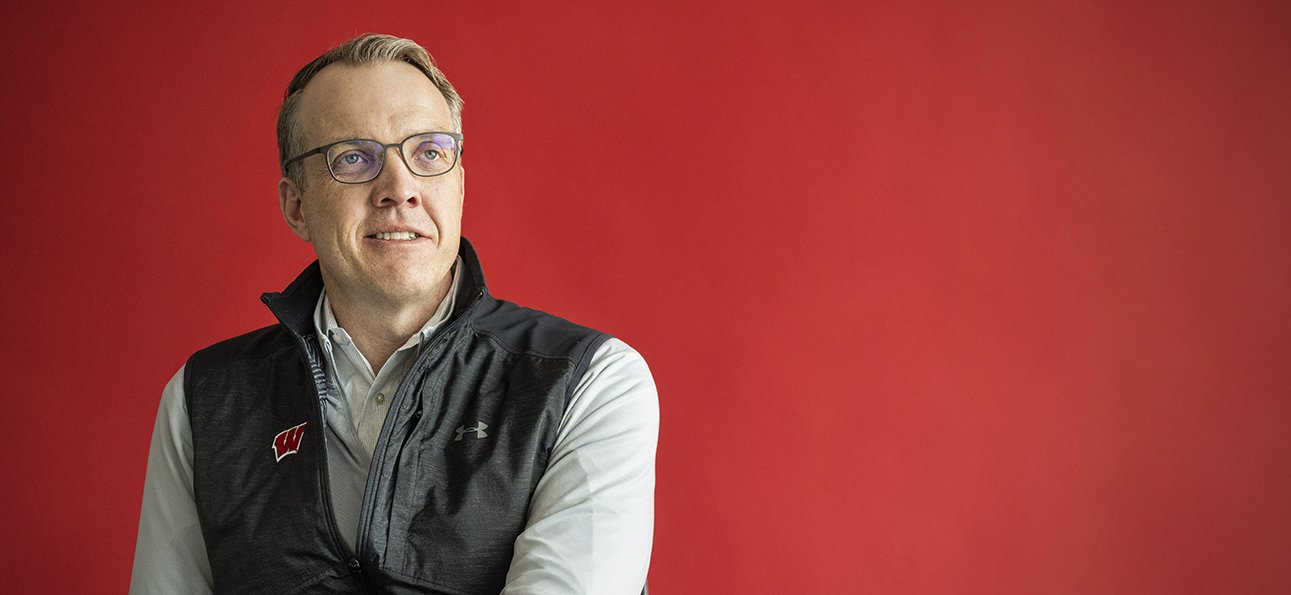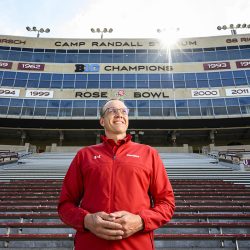
Upholding UW–Madison Values
Athletic Director Chris McIntosh ’04, MS’19 insists on “doing it the right way” during a turbulent time for college sports.
The landscape of college athletics looks a lot different today than it did when Chris McIntosh ’04, MS’19 took over as the UW’s athletic director last July. On his start date, the NCAA adopted a new policy allowing college athletes to profit from their use of name, image, and likeness (NIL). A week before, the Supreme Court had ruled against limiting education-related benefits for student-athletes. And soon after, new COVID-19 strains threatened to disrupt the fall sports slate.
Fortunately, the former Badger football star and native of Pewaukee, Wisconsin, seems up to the task. Measured and even-keeled, McIntosh isn’t fazed by change. He welcomes it.
“I’m really proud of the way our staff and our administration have worked through this change,” says McIntosh, who returned to the UW in 2014 after a successful business career and quickly rose through the administrative ranks. “I’m even more proud of the way our student-athletes have dealt with it. They’re the ones who are the most inspiring out of this.”
What has been your approach to dealing with all the uncertainties?
Our focus is to embrace the change. Don’t resist it. Advocate for what we think is most important, which is education. And then seek opportunity to enhance our program in ways that we couldn’t have prior to this change.
The graduation rate of student-athletes is more than 90 percent. What is the department doing to maintain that level of academic success?
We talk about coming to the University of Wisconsin as a 40-year decision, not a four-year decision. The experience that our student-athletes have here within their sport and within the classroom are two major components of it. But then there’s this other dimension, which is the human being. And we’ve got an incredible team of people who help position our student-athletes to be successful in the long game, in their lives and in their careers.
Last year was a difficult one for men’s basketball coach Greg Gard, culminating in a leaked locker room recording of senior players criticizing him. You stuck by him in the aftermath. Why was that the right decision?
I’ve been on some successful teams that have had difficult conversations throughout the year. I think it’s a healthy thing when players feel comfortable having real conversations. Those are closed-door meetings, meant for the team and for the coaches. It was an incredible breach of trust that those conversations were shared. And I thought it was important to support Coach Gard through that. He’s done a great job turning that experience into something that has helped this team achieve their success.
In December, the women’s volleyball team won its first NCAA title. How did you feel watching that five-set championship match?
My short answer is that it was torture. I’m kidding, obviously, but there were very few moments of those games that were comfortable. And that’s because it was competition at its highest. It was everything you could have asked for in a volleyball match. I was so happy for the players and for the coaches and for our staff. There have been so many sacrifices made, so many decisions over the course of years and years that have led to the culmination in winning a national championship. And I was just moved to be there and to witness the joy they experienced.
This year marks the 50th anniversary of the Title IX legislation. What do you see as its lasting impact on college athletics?
It would have been impossible for me, a long time ago as a student-athlete, to appreciate the impact of Title IX. It’s not impossible for me now as a father of three, including two daughters. My oldest is going to go play college volleyball next year [at Colorado State]. My youngest daughter, who’s a sophomore, aspires to do so. And my wife, Deann [’99], was an athlete here in our rowing program. So it’s personal to me. I’ve talked a lot about what access to a world-class education did in terms of developing me as a person and what it meant for the trajectory of my life. And Title IX has made that opportunity available to tens of thousands of women athletes here who are just as deserving.
In your introductory press conference, Chancellor Rebecca Blank talked about the Wisconsin way and the charge to maintain that culture here. How do you define that phrase?
In its simplest form, it’s about being successful in the classroom and competitive in our sport programs. And it’s as much about doing it the right way. That means doing it with integrity as an extension of this university. It’s shepherding a program that has been here for a long time before I came along and will be here for a long time after I’m done.
How do you think the NCAA’s new NIL policy has played out here?
I think it’s been very healthy, and I’m really supportive of it. It’s been a great opportunity for our student-athletes to capitalize on these new flexibilities. It’s a great learning experience for them, one they can take with them once they leave here. We continue to enhance our programming so that they can both be successful and avoid some of the pitfalls that may exist.
You’ve helped to develop the new Department of Clinical and Sport Psychology. Why is supporting the mental health of student-athletes important to you?
Mental health is just as important as physical health. It’s only been relatively recently that it’s been treated that way. And it’s the right thing to do. I’ve been public about my own experience here as a student-athlete. It was taboo to admit [mental health issues]. If you were talking to somebody or seeking help, you didn’t want it to be found out. And I’m proud of the fact that’s not the case today.
Did you receive any advice from former Athletic Director Barry Alvarez that sticks with you today?
Barry has always been there for me, in different ways, in different roles. All I have to do is pick up the phone and give him a call. The first question that Barry would always ask in every decision is, “What’s best for the kids?” And I don’t think that asking that question will ever serve us wrong.
Published in the Summer 2022 issue



Comments
Pete Christianson June 18, 2022
The right pick for AD. Great interview.